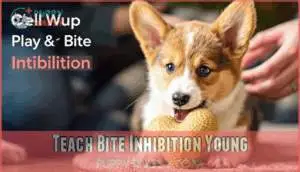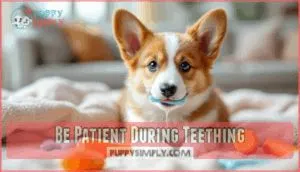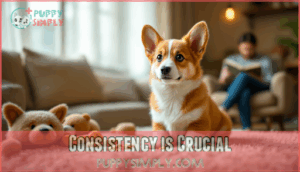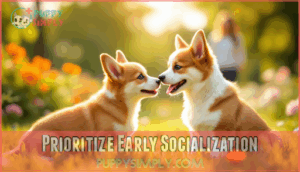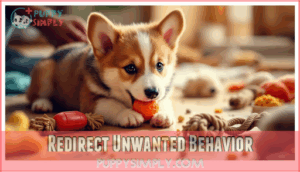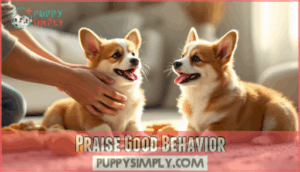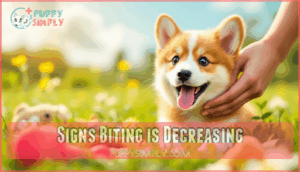This site is supported by our readers. We may earn a commission, at no cost to you, if you purchase through links.
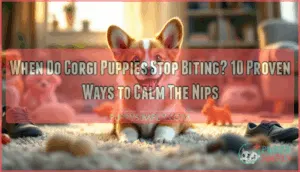
Most corgi puppies begin showing reduced biting between four and six months old as their adult teeth come in and early training takes hold, though the timeline varies based on your consistency and their individual temperament.
The good news? You’re not powerless during this nippy phase—specific training techniques can dramatically speed up the process and save your skin in the meantime.
Table Of Contents
- Key Takeaways
- Understanding Puppy Biting
- Offer Chew Toys for Relief
- Teach Bite Inhibition Young
- Be Patient During Teething
- Consistency is Crucial
- Prioritize Early Socialization
- Redirect Unwanted Behavior
- Praise Good Behavior
- Seek Expert Help if Needed
- Signs Biting is Decreasing
- Frequently Asked Questions (FAQs)
- How to stop a Corgi puppy from biting?
- Why is my Corgi puppy biting me?
- Do corgi puppies bite?
- Can a Corgi puppy bite a nip?
- Is your Corgi biting you?
- What should I do if my Corgi Bites Me?
- How can I tell if my puppy’s biting is just playful or a sign of aggression?
- Can adult corgis still bite during play?
- How does herding instinct affect biting behavior?
- What role does genetics play in biting?
- Conclusion
Key Takeaways
- Most corgi puppies significantly reduce biting between four and six months old as adult teeth emerge and consistent training takes effect, though individual temperament and your dedication to redirection techniques directly impact this timeline.
- Teaching bite inhibition early through immediate feedback—like a sharp yelp when nipping occurs, followed by pausing play—mirrors natural littermate corrections and proves far more effective than punishment in establishing gentle mouth habits.
- Consistency across all household members is non-negotiable: using identical responses to every nip, the same verbal cues, and uniform reward systems prevents mixed signals that can extend the biting phase by weeks or even months.
- Professional intervention becomes essential when biting intensifies past six months, draws blood regularly, or accompanies signs of fear or aggression—situations where certified trainers bring specialized behavioral therapy that standard home training can’t address.
Understanding Puppy Biting
Every Corgi owner quickly learns that puppyhood comes with plenty of little nips and nibbles, thanks to their curious nature and those famous herding genes. It’s simply a part of Corgi puppy development—biting phases are shaped by a mix of breed instincts, teething discomfort, and a need to make sense of the world around them.
These bite causes aren’t a sign of trouble; rather, they’re natural steps in learning boundaries. Corgi puppy behavior might test your patience, but early, consistent training methods like gentle yelps, redirecting, and rewarding calm moments teach bite inhibition.
Corgi puppy biting isn’t misbehavior—it’s a natural learning phase that responds to early, consistent training through redirection and positive reinforcement
With time and practice, you’ll see biting fade, replaced by a much calmer companion keen to connect with you.
Offer Chew Toys for Relief
If your Corgi puppy seems determined to turn your hands or furniture into a chew toy, there’s a much better way to soothe those busy little teeth. Investing in chew toys is essential for teething relief and puppy comfort. Choose a variety—think rope, tough rubber, and plush options.
Toy rotation keeps your puppy curious and prevents boredom, while stuffed toys (try peanut butter inside) offer lasting engagement. During the intense teething phase, these puppy teething solutions do more than distract; they provide healthy outlets and bite prevention.
Notice your pup gnawing on the right things? Offer praise and an extra cuddle. This simple routine not only protects your home but also gently teaches your corgi puppy what’s allowed, laying the groundwork to help stop biting as they grow. A smart toy strategy really does make for calmer, happier pups.
Teach Bite Inhibition Young
It’s remarkable how a simple squeak or yelp can teach your puppy the boundaries of play, especially when you’ve just convinced those sharp little teeth to switch from your fingers to a favorite chew toy. This kind of feedback—mimicking what their littermates would do—helps your Corgi puppy understand bite inhibition early.
When playful biting gets too rough, let out a sharp but gentle sound and calmly pause play. They’ll learn fast that only a gentle mouth keeps the game going. Pair these calming techniques with lots of praise when your pup uses soft jaws.
With steady, consistent puppy training, you’ll help stop biting before it becomes a habit that’s hard to break.
Be Patient During Teething
Just when your little herder starts to master gentler play, those new teeth come in and everything feels like fair game for a good nibble. The puppy teething phase—usually from 3 to 6 months—can turn even the sweetest corgi puppy into a relentless chewer, searching for relief.
You’ll spot Teething Symptoms like drooling, sore gums, and an uptick in Bite Pressure. This stage in Puppy Development calls for patience.
Offer chilled chew toys or frozen carrots to soothe aching mouths. Practice gentle discipline: calmly pause play if things get too rough. With time, variety in chew toys, and lots of positive attention, you’ll notice your puppy learning to stop biting.
Consistency is Crucial
Every time your corgi puppy nips, you need to respond the exact same way—because mixed signals only muddy the lesson and stretch out the biting phase for weeks longer than necessary. When you establish Consistent Discipline and clear Boundary Setting, your pup begins to understand what’s acceptable within just a few weeks. Make sure everyone in your household uses identical Training Routines so your corgi can’t exploit loopholes.
Here’s how to maintain that consistency:
- Stop play immediately and redirect attention to an approved chew toy
- Use the same "stop and wait" verbal cue each time nipping occurs
- Reward calm behavior with treats and praise through Positive Reinforcement
- Keep Reward Systems predictable so your puppy connects gentle play with good outcomes
- Enlist all family members to use identical responses when teeth touch skin
With patience and unwavering routine, you’ll stop biting before six months.
Prioritize Early Socialization
The first few months of your corgi’s life open a critical window—one that shapes whether your pup will greet strangers with a confident wag or a nervous nip. Between 3 and 16 weeks, your puppy’s brain is primed for Social Bonding and learning Canine Communication.
Arrange controlled Puppy Interactions with vaccinated dogs, friendly people, and varied settings to build confidence. Environmental Exposure to everyday sounds—vacuums, traffic, doorbells—teaches your Corgi puppy that novelty isn’t threatening. Monitor body language during each session; if your pup freezes or backs away, slow down.
These positive experiences lay the foundation for puppy development, helping your herding breed understand appropriate responses within Pack Dynamics. With thoughtful Corgi socialization, you’ll raise a well-adjusted companion who communicates with play, not teeth.
Redirect Unwanted Behavior
When your corgi clamps down on your hand mid-play, you’ve got about three seconds to turn that impulse into a teachable moment before the behavior reinforces itself. Swap your hand for a sturdy chew toy immediately—frozen Kongs or rope tugs work wonders for redirecting behavior. The moment your pup latches onto the toy instead of you, praise them warmly.
This positive reinforcement teaches bite inhibition far more effectively than scolding ever could. Calming techniques like offering interactive toys create behavior modification through gentle discipline.
If your puppy refuses the trade and continues nipping, calmly remove your attention by standing up and turning away—ignoring behavior sends a clear message. With consistent redirection, you’re stopping puppy biting by showing your corgi that toys earn engagement while skin-nipping ends the fun.
Praise Good Behavior
Your puppy isn’t going to magically understand that gentle play earns your approval—you need to spell it out every single time they get it right. The instant your corgi chooses a chew toy over your fingers or settles into calm energy during play, mark that moment with enthusiastic praise—"Yes, good!"—and follow it with a small treat.
This positive reinforcement creates a clear feedback loop in your puppy’s mind: soft mouth equals rewards. Reward training works because dogs naturally repeat behaviors that bring good outcomes. Keep treats handy during playtime so you can reinforce bite inhibition the second it happens.
Pair your verbal praise with a gentle touch along their chest or shoulders, reinforcing the connection between calm behavior and affection. This behavior modification approach accelerates learning far more effectively than corrections alone.
Through consistent canine training that celebrates what’s right, you’re shaping dog behavior that lasts well beyond puppy socialization and into adulthood.
Seek Expert Help if Needed
Sometimes the biting doesn’t ease up on its own—even with your most determined effort—and that’s when professional guidance becomes essential. You’re not failing your corgi by seeking expert intervention; you’re giving them the specialized support they deserve. Certified trainers and canine behavior specialists bring force-free methods and behavioral therapy techniques proven to work when standard corgi puppy training hits a wall.
Consider professional training support if you notice:
- Biting that intensifies rather than softens beyond six months despite consistent redirection
- Signs of fear or aggression accompanying the nipping, not just playful mouthing
- Blood drawn regularly or bites that cause injury, indicating poor bite inhibition
- Corgi behavior problems that overwhelm your household or create safety concerns
Understanding canine body language is vital in addressing these issues. With the right expertise, most persistent canine behavior issues improve markedly—often within just a few weeks of structured intervention.
Signs Biting is Decreasing
Tracking bite frequency gives you hard evidence that your work is paying off. Most corgi puppies naturally dial back the nipping by 5 to 6 months as the teething phase winds down and adult teeth settle in. You’ll notice gentler mouthing behavior during play—fewer incidents per hour and less pressure when teeth make contact.
Nipping reduction becomes obvious when your pup responds quickly to calming techniques and redirection toward toys instead of ankles. Bite inhibition improves steadily with consistent corgi puppy training, and understanding corgi biting causes helps you recognize progress. By 6 to 7 months, the heel-chasing instinct fades, and stopping puppy biting transitions from daily struggle to occasional reminder.
As puppies develop, they need guidance on teething and nipping.
Frequently Asked Questions (FAQs)
How to stop a Corgi puppy from biting?
Stopping puppy biting requires consistency and patience. Use positive reinforcement to reward gentle behavior, redirect biting to appropriate chew toys, and teach bite inhibition through socialization.
Combine gentle discipline with obedience training to shape your Corgi puppy’s behavior effectively.
Why is my Corgi puppy biting me?
Most biting happens because of normal Puppy Development—teething pain, playful energy, or herding instincts bred into Corgi Genetics.
Your Corgi puppy isn’t being aggressive; they’re exploring their world through their mouth and need proper Bite Inhibition training.
Do corgi puppies bite?
Absolutely—biting is part of typical puppy development. Corgi puppies explore their world with their mouths, especially during teething.
Their herding genetics can intensify nipping, but proper training methods and bite inhibition techniques will guide your corgi puppy toward gentler behavior.
Can a Corgi puppy bite a nip?
Yes—nipping and biting are basically the same behavior in Corgi puppies. Breed instincts drive herding-style nips at ankles, while puppy development and teething trigger exploratory mouthing.
Bite inhibition training teaches Corgi puppies gentler play, reducing both nips and bites effectively.
Is your Corgi biting you?
Take a moment to observe what’s happening. Does your Corgi puppy latch onto your fingers during play?
Understanding Corgi behavior and biting causes helps you apply effective training methods and bite prevention strategies for proper puppy development.
What should I do if my Corgi Bites Me?
If your Corgi puppy bites you, stop and wait—freeze all interaction immediately. This teaches bite inhibition through clear owner response.
Redirect biting behavior toward appropriate chew toys, then use positive reinforcement when your Corgi puppy calms down.
Consistent addressing of biting behavior prevents future aggression management issues.
How can I tell if my puppy’s biting is just playful or a sign of aggression?
Actions speak louder than words—your Corgi puppy’s body language reveals the truth. Playful biting includes relaxed posture, wagging tails, and bouncy movements. Aggression shows through stiff bodies, growling, snarling, or direct stares.
If biting escalates despite training, consult a professional trainer immediately.
Can adult corgis still bite during play?
Even well-trained Adult Corgi may retain playful nip tendencies rooted in Breed Instincts. Socialization Effects and bite inhibition training reduce severity, making most Adult Biting harmless.
Environmental Impact influences Biting Behavior, but canine training guarantees control.
How does herding instinct affect biting behavior?
Your Corgi puppy isn’t trying to herd you—except that’s exactly what’s happening. Herding instincts drive heel nipping and ankle biting in the first 3 to 5 months, peaking during active play.
Consistent boundary training usually stops this behavior by 8 months.
What role does genetics play in biting?
Genetics plays a significant role in your Corgi’s biting behavior. Inherited herding instincts and breed-specific traits hardwire nipping tendencies into their DNA.
This genetic predisposition means working-dog ancestry naturally influences how—and how often—your puppy mouths during play and exploration.
Conclusion
Your patience will pay off, your consistency will create boundaries, and your commitment to these proven techniques will transform those sharp nips into gentle play. When do corgi puppies stop biting? The timeline sits in your hands as much as theirs—every redirected bite, every well-timed toy, every moment of calm praise builds the foundation for a well-mannered adult dog.
The teeth may be temporary, but the training you’re investing in now shapes a lifetime of good behavior.
- https://www.fourcornersvet.com/site/blog/2024/02/22/how-stop-puppy-biting
- https://www.reddit.com/r/corgi/comments/16y9tmv/9_week_old_puppy_is_nipping_constantly/
- https://iheartdogs.com/how-to-stop-a-corgi-puppy-from-biting-a-comprehensive-guide/
- https://peachonaleash.com/beyond-puppy-biting-when-mouthy-behavior-continues-into-adolescence/
- https://pmc.ncbi.nlm.nih.gov/articles/PMC10376210/

